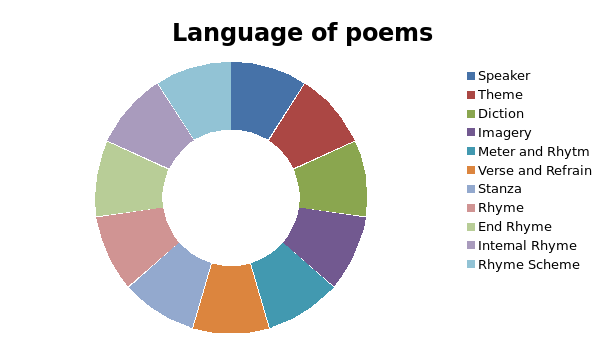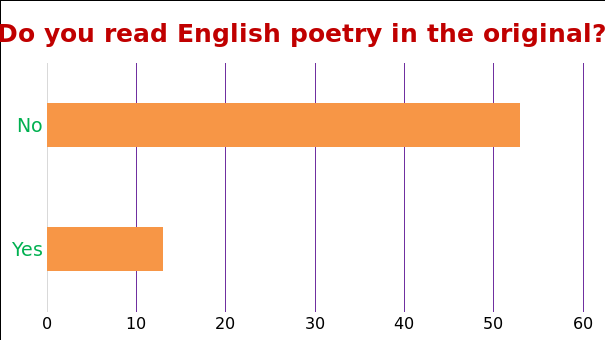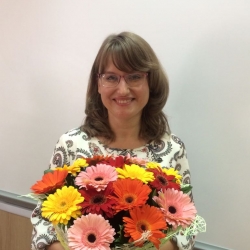Plan:
Page
Introduction 3
Variety of English poetry 4
Types of poems 4
Language in English poetry 4
Literary translations of British poems by famous Russian
writers 5
The importance of poetry for modern students
Poetry album 6
Conclusion 7
Information sources 8
Supplements 9
Introduction
The theme of our research project is «Discovering English Poetry» and we’re honored to present you the result of our joint efforts with the members of the club “#Literature# English#” lead by Rogozhnikova V.A. at the lyceum 22.
Since the beginning of the school year we have discovered a lot of different English poems and some of us have started to create their own poems and literary translations of some famous British writers. First we did it spontaneously, then we came up with the idea to organize the process of writing poems in English. Therefore, we hypothesized whether any child studying English can write poetry in English and decided to make our own poetry album.
So, the object of our research is:
There are following tasks:
to know the types of poetry language and the patterns of rhyme scheme;
to make a survey among our classmates to know if they read Russian or British poems and what they know about them;
to write poems in English.
During our work at the topic we have used following methods of study:
the method of narration and description;
the method of rhyming words:
the method of survey;
the method of analysis and comparison.
Variety of English poetry
English poetry has a long and distinguished history. Poets began writing in Old English as early as the seventh century, but the most famous Old English poem, Beowulf, has been dated to the eight century as an example of a heroic epic, a long narrative poem that mixes history and legend.
Poetry from the Middle Ages was often religious or romantic. The most famous pieces were Sir Gawain and the Green Knight, Piers Plowman and The Canterbury Tales.
After the Renaissance, English poets began experimenting with new styles of writing. The poet Thomas Wyatt wrote sonnets of fourteen rhyming lines. Other poets, such as Thomas Campion, wrote songs in which their poetry was set to music.
The history of English poetry is unthinkable without William Shakespeare, an English poet, playwright and actor, who wrote “Romeo and Juliet”, “A midsummer night’s dream”, “Othello”, “King Lear”, “Hamlet” and many others. Apart from that Shakespeare wrote 154 sonnets.
At the end of the eighteenth century, English poetry went through a Golden Age. The most known poets was Lord Byron, a poet and adventurer, he wrote masterpieces such as Don Juan and Childe Harold’s Pilgrimage. Other Romantic poets were John Keats, Samuel Taylor Coleridge, Percy Bysshe Shelley.
Lord Tennyson, Elizabeth Barrett Browning, Miln A.A and William Butler Yeats were very popular in the nineteenth and twentieth centuries.
Types of poems
Poems are emotions put into measure. “The emotion must come by nature but the measure can be acquired by art” said Thomas Hardy. Poems are pieces of writing in which the expression of feelings and ideas is given intensity by particular attention to diction (sometimes involving rhyme), rhythm, and imagery.
English poems are divided in two types: figurative and literal.
Figurative poems.
Language used to create a special effect in feeling ; characterized by figures of speech or language that compares, exaggerates, or words that mean something other than its literal meaning.
Literal poems.
The exact primary meaning of a word or words. In our poetry album we wrote literal poems.
Language in poems
Before writing poems we decided to know more about their language. we present the poem as a symbiosis of the following elements:

Speaker. The person who speaks in or narrates a poem. The speaker and writer are NOT necessarily the same person
Theme is a statement about life that a particular work is trying to get across to the reader. Theme same as Main Idea.
Diction an authors choice of words based on their correctness, clarity (clear), or effectiveness. Some words are purposely chosen to represent ideas, not to come right out and say them.
Imagery . words or phrases a writer selects to create a certain picture in the mind; based on sensory detail. Imagery uses descriptive word to awoke the five senses.
Meter and Rhythm describe patterned repetition of stressed and unstressed syllables in a line of poems.
Verse and Refrain. Verse metric line of poems names according to the kind and number of feet composing it. Refrain - repetition of a line or phrase of a poem at regular intervals, especially at the end of a stanza (Chorus).
Stanza a division of poems named for the number of lines it contains. When you see a space between lines in a poem, that means a new stanza in the beginning.
Rhyme is similarity or likeness of sound existing between two words
End Rhyme. Rhyming words that appear at the ends of two or more lines of poems.
Internal Rhyme occurs when rhyming words appear in the same line of poems. Rhyme Scheme is the pattern or sequence in which rhyme sounds occur in a stanza or poem. To Label a rhyme scheme, a similar letter is assigned to each pair of rhyming sounds in a stanza.
First, we wrote poems in the image of ready-made poetry, such as verse Miln A.A. «Now I’m six»
When I was one,
I had just begun.
When I was two,
I was nearly new.
When I was three,
I was hardly me.
When I was four,
I was not much more.
When I was five,
I was just alive.
But now I am six,
I'm as clever as clever.
So I think I'll be six
now and forever.
We’ve created lots of variations, the best of them are:
Kirpikova T, Class 5 G
When I was ten,
I did just I can.
Now I am eleven,
And my sister is seven.
We’re the youngest in the class
And we go to school by bus.
When I’ll be twelve,
I’ll grow up to the book shelf.
When I’ll be fifteen,
I will know what all tenses mean.
When I’ll be twenty four,
I’ll have a cat with a white fur.
Bagdushina P. Class 5 G
Now I’m twelve
And my brother’s an elf!
When I will be thirteen
I’ll want to be fourteen!
When I will be fourteen,
I’ll be a clever teen!
When I will be fifty years,
I ‘ll keep surely three bears!
When I’ll be one hundred years,
I think, I will not go upstairs.
Literary translations of British poems by famous Russian writers
There are a lot of Russian writers, known for their translations into English,
e.g. Innokentii Annenskyi, Vasilii Aksyonov, Boris Pasternak, in his translation we learned the masterpieces of Shakespeare and so on. But one of the brightest, in our opinion, was Samuel Marshak. Samuel Marshak published his first translations when he was only 17 years old, it was a poem by the Jewish poet Chaim Nahman Bialik, the originals of which are written in Yiddish and Hebrew.
In September 1912, the young poet went to study in the UK, travelled a lot around the country, listening to folklore, and he began to be interested in translations. Marshak adapted for Russian-speaking readers a number of English and Scottish ballads, which later made him famous. He opened for Soviet readers many works of Shakespeare, Wordsworth, Keats, Kipling and others. E.g. the poem of W.Blake “London”.
London
I wander through each chartered street,
Near where the chartered Thames does flow,
And mark in every face I meet,
Marks of weakness, marks of woe.
In every cry of every man,
In every infant's cry of fear,
In every voice, in every ban,
The mind-forged manacles I hear:
How the chimney-sweeper's cry
Every blackening church appals,
And the hapless soldier's sigh
Runs in blood down palace-walls.
But most, through midnight streets I hear
How the youthful harlot's curse
Blasts the new-born infant's tear,
And blights with plagues the marriage-hearse.
Samuel Marshak “London”
По вольным улицам брожу,
У вольной лондонской реки,
На всех я лицах нахожу
Печать бессилья и тоски.
Мне слышатся со всех сторон
Стенанья взрослых и детей,
Мне чудится тяжелый звон
Законом созданных цепей...
He also translated a lot of fables and rhymes. For example the fable “Mary’s lamb”.
Mary's Lamb
Mary had a little lamb,
Its fleece was white as snow,
And everywhere that Mary went
The lamb was sure to go;
He followed her to school one day-
That was against the rule,
It made the children laugh and play
To see a lamb at school.
And so the teacher turned him out,
But still he lingered near,
And waited patiently about,
Till Mary did appear.
And then he ran to her and laid
His head upon her arm,
As if he said, "I'm not afraid-
You'll shield me from all harm."
"What makes the lamb love Mary so?"
The little children cry;
"Oh, Mary loves the lamb, you know,"
The teacher did reply,
"And, you, each gentle animal
In confidence may bind,
And make it follow at your call,
If you are always kind.
Samuel Marshak
У нашей Мэри есть баран.
Собаки он верней.
В грозу, и в бурю, и в туман
Баран бредет за ней.
Водила Мэри на луга
Барашка с первых дней.
Он отрастил давно рога,
Но ходит вслед за ней.
Вот Мэри вышла из ворот.
Баран бредет за ней.
Она по улице идет.
Баран идет за ней.
Она доходит до угла.
Баран идет за ней.
Она помчалась, как стрела.
Баран бежит за ней.
Она вбегает в школьный сад.
Баран бежит за ней.
Она кричит: "Иди назад!"
Баран идет за ней.
Она кричит: "Уйди сейчас!"
Баран идет за ней.
Она вбегает в первый класс.
Баран бежит за ней.
Но Мэри двери перед ним
Закрыла поскорей,
И он, печален, недвижим,
Остался у дверей.
Часы пропели девять раз
Из будочки своей.
Идет учительница в класс.
Баран идет за ней...
На этом кончу я рассказ.
Что может быть ясней?
Вошла учительница в класс,
Баран вбежал за ней!
The students of our Club #Literature#English# also made this translation, the best was Kirpikova T.5 G with her translation of the poem.
У Мэри был ручной баран,
Белей чем облака.
Не отлучался от нее
Он никогда пока.
Явился в школу с ней баран,
Нарушил он закон.
Смеялись дети, увидав
Барашка из окон.
Его учитель развернул,
Пытаясь выгонять.
Баран же верно продолжал
Как вкопанный стоять.
И Мэри к парте подошла,
Приник барашек к ней.
Тогда же понял целый класс,
Что нет его верней.
Питомец будто бы сказал:
-В надежных я руках.
Меня с тобою обойдут
И горести, и страх.
-Как удалось, - кричат друзья,
Барашка воспитать?
-За ним ухаживала я ,
Была ему как мать.
Когда дана зверьку еда
И он запущен в дом,
Ответит он тебе тогда
И лаской, и теплом.
The importance of poetry for modern students
The members of the club #Literature English# were interested to know, what the pupils of our lyceum think of English poetry and English writers. Tthat is why we’d like investigate our classmates and made a survey among them. Results you can see in this table. There were three questions:
Do you like English poems?

63 percent of pupils answered “Yes”
25 percent of pupils answered “No”
12 percent of my classmates said “I don’t know”
2. Do you read English poetry in the original?

3.What British poets do you know?
The most students called William Shakespeare, Robert Burs, Johanna Rowling with her poems in her well-known books about Harry Potter and George Byron.
The Student Kirpikova T. Class 5 G made an attempt to translate some poems from J.K.Rowling and this is her successful result:
“Oh, you may not think I’m pretty
But don’t judge on what you see,
I’ll eat myself of you can find
A smarter bat than me.
You can keep your bowlers black,
Your top hats sleek and tall,
For I’m the Hogwarts Sorting Hat
And I can cap them all.
There’s nothing hidden in your head
The Sorting Hat can’t see,
So try me on and Iwill tell you
Where you ought to be.
You might belong in Gryffindor,
Where dwell the brave at heart,
Their daring, nerve and chivalry
Set Gryffindors apart,
You might belong in Hufflepuff,
Where they are just and loyal,
Those patient Hufflepuffs are true
And unafraid of toil,
Or yet in wise old Ravenklaw,
If you’re ready mind,
Where those of wit and learning,
Will always find their kind,
Or perhaps in Stytherin
You’ll make your real friends,
Those cunning folk use any means
To achieve their ends.
So, put me on! Don’t be afraid!
And don’t get in flap!
Быть может некрасивая,
Но не судите строго,
Умней меня на свете нет,
Хоть шляп на свете много.
Меня красивей все они,
Но это только вид,
И разум мой их внешность
Красивую затмит.
И от меня не скроете вы помыслы
Нет-нет!
Лишь подойди и я скажу
Какой ваш факультет.
Попасть ты можешь в Гриффиндор,
Лишь если ты смельчак!
А трусам явно не попасть
За стол его никак!
Вены и преданны всегда
Ребята Пуффендуя.
И вас туда за честный труд
Определить смогу я.
И если у тебя есть план
По поводу наук,
Тебя придется в Когтевран
Отправить, милый друг!
А если путь твой лишь один:
Хитрить и нагло врать,
Пойдешь, товарищ, в Слизерин,
И это, как пить дать.
Меня надень –
И факультет скажу тебе сейчас.
You’re in safe hands (though I have none)
For I’m Thinking Cap!
В руках надежных (коих нет)
Вы в этот славный час!
Poetry album
The student of he club #Literature English# were so inspired by British poetry in its diversity and some of us began to create own poems in English! Later we decided to gather them in one place – our poetry album and to present it in a project competition. Now, we’d like to read you some poems!
Kirpikova T. “ My special day”
I love my school and teachers too.
And we can always say
That day when I was here for tests
Was really special day.
So you can say: It’s usual
But I will reply: O.K.
You don’t see how you can speak
About a special day?
And I want tell to you, to friends
Tomorrow and today
That day when I was here for tests
Was really special day.
Bagdushina P. “Magic creatures”
Somewhere in the depth of the forest
Uncharted creatures lurk.
They hide in grass which tallest of the tallest
And come out in the dark.
They aren’t shown to people,
A few of them saw them.
But if you want to find some creatures,
It’s better leave then there!
Markelova M. “What is your favourite season?”
What is your favourite season?
My favourite season is summer
Because I like beetles and crickets,
Because I like days which are sunny.
What is your favourite season?
My favourite season is winter
Because I like having a snowball fight.
All seasons
we need for all grow-ups
And for little kids are so bright.
Conclusion
In conclusion we would like to say:
Some students of Lyceum 22 can write poems in English, but only those who are inspired by British poetry, like poems and have talent to rhyme their ides.
It I also very important to write and organize poems in one place, otherwise something said aloud but not written down on paper is quickly forgotten. That’s why we made our poetry album.
According the survey unfortunately only about 50 percent of pupils read English poetry in Russian and know only a few British writers. That’s why the task of our club #Literature English# to introduce different English writers to a large number of students and to inspire them to writing poetry and prose by our own example.
Information sources:
Мюллер. В.К. Новый англо-русский словарь. – М.: Русский язык, 2004. – 880 с.
Трэверс П.Л. Мэри Поппинс. – М.: АЙРИС – пресс, 2014.-144 c.
Трэверс П.Л. Мэри Поппинс возвращается. – М.:РОСМЭН, 2015. – 144c.
Трэверс П.Л. Мэри Поппинс открывает Дверь. – М.:РОСМЭН, 2015. – 160c.
The Pocket Oxford Russian Dictionary//comp. by J. Coulson. – М.:ИНФРА – М, 2002. – 624 с.
Internet sources:
https://en.wikipedia.org
https://neoenglish.wordpress.com
https://www.proza.ru
http://fluentfocus.com
https://studentguide.ru
https://eksmo.ru
Supplement 1.
Questionnaire survey
Who is Mary Poppins?
a nanny
a writer
a doctor
Have you ever read about Mary Poppins?
Yes
No
Results:
76 percent - a nanny.
14 percent - a writer.
10 percent - a doctor.
47 percent – yes
53 percent - no
Supplement 2


























